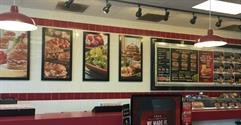Convenience is affecting the way we eat. A new study shows consumers are choosing the ‘one-stop-shop’ appeal of big box retail over independent grocery stores.
Walmart, Target, even pharmacy chains like Walgreens and CVS are fulfilling grocery needs these days.
The study published by retail design firm King Retail Solutions in conjunction with the University of Arizona’s Terry J. Lundgren Center for Retailing surveyed over 1200 shoppers and found that 77% percent of respondents across the three demographics - Millennials, Gen X and Baby Boomers - bought groceries from a non-grocer in 2013.
And the trend looks set to continue. In fact, 96% of those surveyed said they will buy food from places other than grocery stores in 2014.
Besides the big box stores, the survey found that people also turn to dollar stores and convenience stores to stock their fridges.
Surprisingly, it’s not just those on a limited budget shopping for groceries at non-traditional outlets.
In fact, the study revealed that the wealthier the shopper, the more likely he or she is to take their weekly shopping list somewhere other than their local supermarket.
So how can independent grocery stores compete with the big guys? Here are 5 ways:
1. Adapt Quickly
As an independent store, you will be able to be more flexible and adopt product changes more quickly than chain stores. If you get a request from a customer, you can add that product to your retail mix with relative ease compared to your competition.
2. Go niche and explain why
It’s almost impossible for an independent grocer to compete with big box stores on price alone. Keep that in mind when choosing your inventory and stock local, private-label and high-quality products.
Some customers are willing to pay more for a product if it’s of a higher caliber, fresh, locally produced or only available at your store.
However, you’ll need to communicate that information clearly so that your customers are informed as to why your prices may be different to your competitors.
3. Specialize
If your community will support it, expand your store’s offerings by adding prepared foods, salad bars, baked goods and other specialty food items at your store.
Consider catering as an additional revenue stream.
4. Provide excellent customer service
Big box stores aren’t really known for their attention to customer service. But as a local, independent grocer, you can target this.
Know your customers by name and buying habits. Train your employees to be courteous, helpful and offer your clientele assistance to their cars with their groceries without expecting a tip.
5. Give back
As an independent store owner, you have the ability to participate in your local community on a higher level than a chain with many locations.
Donate excess food to local food banks and shelters and host fundraisers for local charities at your store.
You could organize a team volunteer project that your employees can get behind, or offer a special incentive to get people to shop with you (whilst giving back by donating a percentage of that day’s sales to a good cause).
All of these initiatives will help your brand be prominent and have a positive presence in your community.
There’s no doubt competition is fierce in today’s grocery market. Although most small, independent grocers don’t have the resources to go up against the big box stores on price alone, there are many other ways to distinguish oneself in the community, and become a retail option of choice.
Buying a grocery store? Sign up for a BusinessesForSale.com account to receive priority listings, as well as the latest advice and features directly to your inbox!




